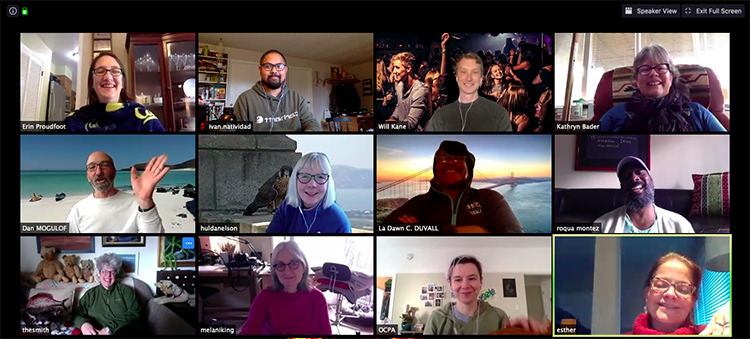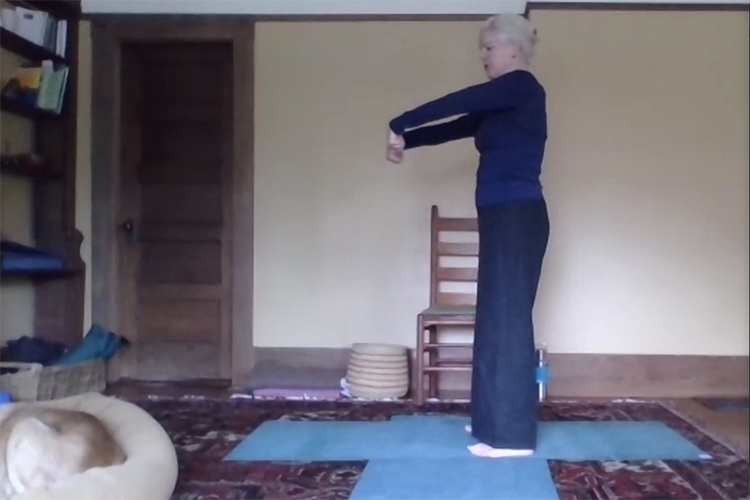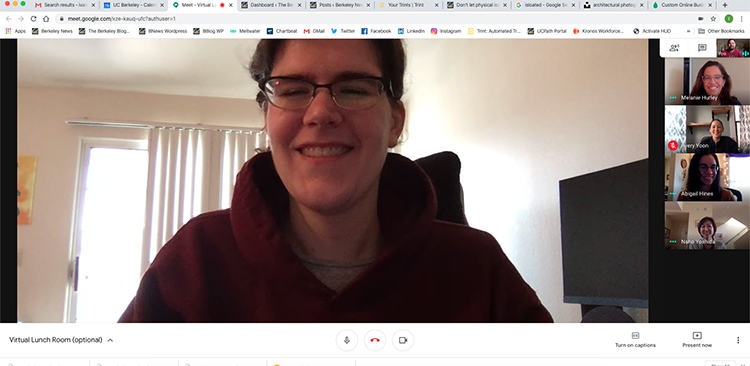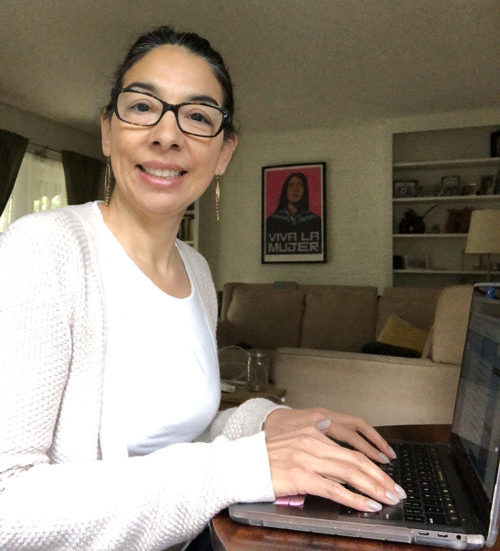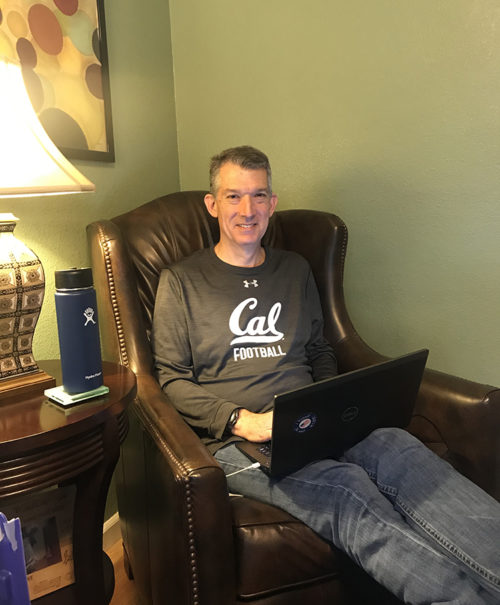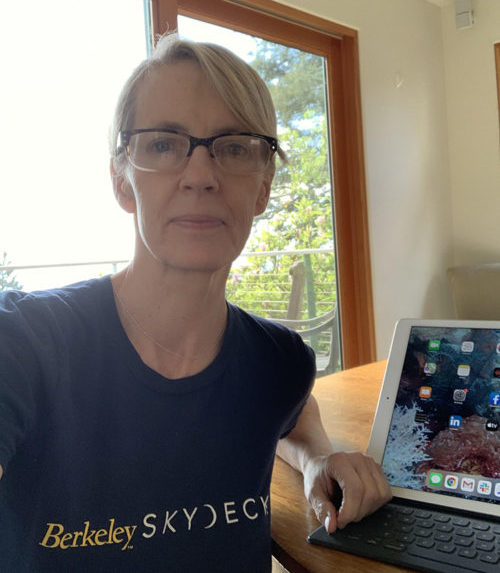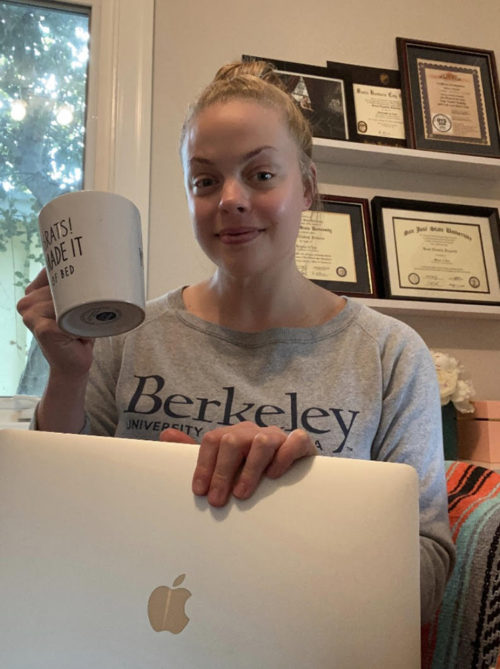UC Berkeley staff strive for normalcy amidst pandemic
Despite COVID-19, campus employees maintain a sense of community
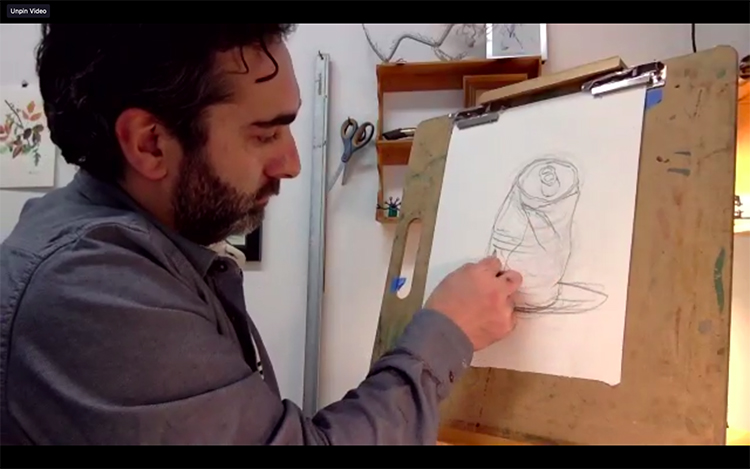
March 24, 2020

Adam Sterling, top center, with UC Berkeley’s Center for Law and Business said that his team has been doing “social check-ins” each day on Zoom. “We try not to discuss work and just check in on family, pets and each other,” he said. “It has been helpful to have a social outlet and I think it has made the team feel less isolated.” (Photo courtesy of Zoom)
Danny Neece is leading online drawing classes, the ones he usually taught at UC Berkeley’s Berkeley Art Studio, with an emphasis on soda can still-lifes.
Rebecca Delaware and her colleagues in the Office of Student Affairs meet in a virtual hangout at noon each day to talk about pets, kids and the favorite restaurants they can no longer visit. In between taking online professional development classes, Davina Edwards, a staffer in the Office of Communications and Public Affairs, is administering reading and math lessons to her two grandchildren.
Throughout the Bay Area, Berkeley’s more than 13,500 staffers are finding new and creative ways to navigate the shifting reality of remote work during the statewide shelter-in-place. Campus administrators insisted that all non-essential staff begin working from home on March 18, so teams across campus have been logging on to Zoom calls, Google Hangouts or Slack channels ever since.
Those employees deemed essential to campus operations — such as researchers, facilities crews and campus police — continue working on an otherwise empty campus, being careful to practice social distancing.
“It’s almost like a ghost town,” said Kevin Taplin, who goes to campus at 4 a.m. every day to supervise workers in the Cal Zero Waste program. “Campus has never been like this. Not even after 9/11. You look down University Avenue, and it’s static, no cars.”
Finding connection, online
Campus experts said that remote work, and the lack of in-person professional connection that comes with it, can lead to disillusionment, burnout and loneliness.
Stepping back from the day-to-day demands of work to connect with colleagues is important, said Emiliana Simon-Thomas, science director at Berkeley’s Greater Good Science Center, which researches the neuroscience, psychology and sociology of well-being.
“We can honor our own meaningful role in this situation and, ultimately, be there for each other,” Simon-Thomas said. “Knowing that we have trustful, cooperative connections with others, we can see the world and its challenges as less threatening to navigate.”
Devin Wicks, who more than five years ago developed WorkFit, Berkeley’s employee health and fitness program, decided to livestream the program’s yoga classes through Zoom after an Alameda County shelter-in-place mandate was announced early last week.

Kevin Taplin has worked at UC Berkeley for more than 25 years. He helps to supervise the Cal Zero Waste program. (Photo courtesy of Kevin Taplin)
With more than 90 participants logging in to the session last Wednesday, Wicks said it was such a hit that WorkFit will now offer daily sessions for Pilates and strength training, too.
“I think there’s this pent-up anxiety, and a desire for some sort of connected community that people are experiencing right now because we’re all so isolated,” said Wicks. “So, getting people to feel like everything’s going to be okay, that we can get through this together and lift each other up, I think that’s what this is really about.”
Sandra Bass said her staff at Berkeley’s Public Service Center has taken advantage of other online functions such as Netflix Party, which allows groups to watch movies together remotely and connect via chat.
“Within my own community, I have friends who have set up virtual daily morning ‘centering moments’ of just 15 minutes to connect with and support each other,” said Bass. “We also do evening ‘song circles’ where we can sing along together online.”
Finding her own ways to cope with the pandemic, Sarah Fullerton, who leads communications efforts at Berkeley’s College of Environmental Design, has connected with her colleagues through online communities to share tips on maintaining a healthy work-life balance.
“UC Berkeley can appear, from the perspective of employees, as an extremely siloed campus,” Fullerton said. “But this crisis has shown me that it is possible for us to act as a well-oiled machine to help solve problems.”
Coping with cabin fever
While participating in online communities is helpful for some, staff members working at home in close quarters with a partner or children nearby can test their patience. Some said they’ve found solace by taking a break to spend time alone.
“This might mean taking a moment from the tension to go outside, look at the sky, tree bark, petals, insects. Notice smells,” recommended Simon-Thomas. “Stretch your shoulders back, and open your chest. Breathe in deeply, and out slowly.”
At 3 p.m. every day, Simon-Thomas said her husband and three children go outside and have “Corona Time Tea” with their neighbors, keeping the suggested 6-foot distance between them.
Elise Proulx, director of marketing and partnerships at the Greater Good Science Center, said she has taken up “stress baking” to pass the time while home with her spouse, 12-year-old son Errol and various pets.
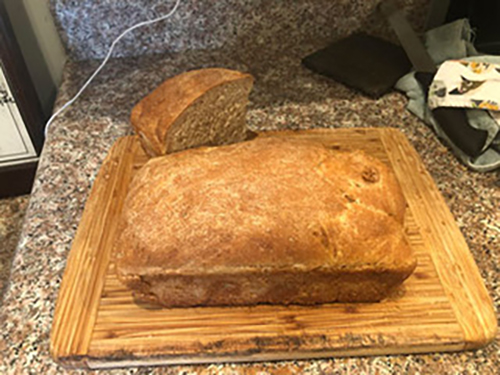
Elise Proulx, director of marketing and partnerships at the Greater Good Science Center, has taken up “stress baking,” to pass the time while at home. (Photo courtesy of Elise Proulx)
“I’m really perfecting my bread-making,” Proulx said. “I also am finding solace in history. I was watching the show ‘American Experience: Influenza 1918’ the other night. Knowing that humanity has gone through crises before, and that my grandparents survived, makes me hopeful.”
After a long work day, La Dawn Duvall, who leads Berkeley’s Visitor and Parent Services, likes to stream the Metropolitan Opera’s online series, a free, live, high-definition streaming service offered by the venue this month.
Meanwhile, Rich Lyons, Berkeley’s chief innovation and entrepreneurship officer, said his team benefits from video conferencing, because it brings to life people who would otherwise simply be voices coming from a computer screen.
“It’s a nice connection, and it brightens our day,” said Lyons. “One of us had his toddler son in his lap. Others had views into their homes and living rooms. It was just a nice, real snapshot that life is real and goes on.”
Taking time to give back
While some Berkeley staff are hunched over a laptop at home, others continue their work on campus in person.
UC Police Department Sgt. Patrick O’Donnell still patrols campus every day, and said that the absence of regular activity is something he has never experienced as a police officer.

UC Police Department Sgt. Patrick O’Donnell takes a selfie with an empty campus in the background. (Photo courtesy of Patrick O’Donnell
“I actually feel bad for the students, because especially for the seniors, the last couple of months of being in college is supposed to be kind of a special moment,” O’Donnell said. “So, I’m sure this is quite a shock to them. It’s a lot to take in.”
Simon-Thomas said feeling like you have no control over situations, like the COVID-19 crisis, can spur a sense of hopelessness and depression, which can make people forget the privileges they should be thankful for in their everyday lives. Remembering those privileges, though, can help people recognize the strength and support they can provide for the community around them, she added.
Jean Smith, business analyst in the Office of Communications and Public Affairs, and her close friend and Berkeley alumna Carolyn Weil have found a way to show support for others during this crisis through their shared hobby of quilting.
Their quilting guild, East Bay Heritage Quilters, heard about several local health care providers who needed masks for their workers, who are potentially exposed to COVID-19 on a daily basis.
Smith said helping to make quilted masks was a “no-brainer,” as the guild made over 1,200 quilted blankets last year for hospitals, survivors of wild fires and children in need.
“Sewing, at any time, is therapeutic,” said Smith, “but never more so than when you see your creation go to someone who really needs some love.”
